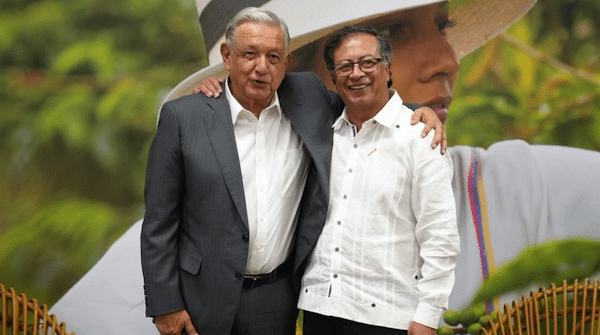The Latin American and Caribbean Conference on Drugs: for Life, Peace and Development, led by Colombian President Gustavo Petro and Mexican President Andrés Manuel López Obrador (AMLO), took place in the Colombian city of Cali between September 7 and 9. During the conference, representatives from 19 countries in the region met to discuss proposals to address the issues related to drug consumption and drug trafficking in the region.
According to the Colombian Foreign Ministry, the conference was aimed at building discussions toward a new drug policy that addresses realities such as drug addiction and overdoses, drug trafficking, ancestral approaches, and traditional uses of plants such as coca. It was the first of many intergovernmental meetings and thematic forums that will be held in the coming years, alongside dialogues with civil society to promote social justice, integral development, attention to root causes, and policy analysis of transnational organized crime in the region.
Colombian President Petro and Mexican President AMLO, who attended the closing ceremony of the conference, condemned the war on drugs promoted in the region by successive United States governments and supported by the EU and the UN, and called for a new international anti-drug policy.
President Petro said that the region has been a victim, not a victimizer, of the failed war on drugs, which in the past five decades has resulted in a million deaths, while 10 million people have been detained in the U.S. for crimes linked to drugs, particularly Black and Latino people. He pointed out that the continent has been complying with the guidelines dictated by the U.S. without questioning them, and stressed that it must stop now.
“The so-called war on drugs has failed, it is useless. If we continue [with it], we will only add another million deaths in Latin America, and we will have more failed states and perhaps [there will be] the death of democracy,” warned Petro.
In this sense, he proposed an alliance between Latin American and Caribbean countries to bring a unified voice to the fight against drug trafficking, by recognizing drug consumption as a public health problem instead of confronting it with a failed militarized approach.
“What I propose is to have a different and unified voice that defends our society, our future and our history and stops repeating a failed discourse…It is time to rebuild hope and not repeat the bloody and ferocious wars, which see drugs as a military problem and not as a health problem for society,” said Petro.
He proposed to confront the problem by deepening democracy and addressing the structural causes: inequality, poverty, lack of opportunities and violence.
President AMLO seconded his Colombian counterpart’s opinion. “I think that the fundamental thing to confront the scourge of drug addiction and violence is to address the causes, with a new criterion, not only think about coercive measures,” said AMLO.
He emphasized on the need to address the problem with a humanistic approach, adding that he will fight against the trafficking of fentanyl whose consumption in the United States leaves more than 100,000 young people dead each year. He advocated that young people must be provided with employment opportunities, good salaries, free university education, and other types of motivation.
The leaders committed to deal with drug-related problems from a non-militaristic vision, but rather one of attention to the causes, promotion of social policies, care for the environment and focus on combating demand before supply. They welcomed the commitments signed by the representatives at the end of the conference.
The countries participating in the conference vowed in a joint statement to address the global drug problem in an “integral, multidisciplinary, balanced, comprehensive, evidence-based and effective manner, which requires addressing the structural causes.”
They also agreed on the need to break the harmful links between drug and firearms trafficking, transnational organized crime, illegal logging, human trafficking, migrant smuggling, money laundering and corruption.
Latin American countries such as Colombia, Ecuador, Peru and Mexico face persistent violence resulting from drug trafficking and the presence of cartels. Drug-related violence has become a major social issue in these and their neighboring countries.
The conference provided them with a common space to work together in dialogue on matters of drugs. According to information from the Colombian Foreign Ministry, representatives from Argentina, Bolivia, Brazil, Chile, Colombia, Costa Rica, Cuba, Ecuador, El Salvador, Guatemala, Honduras, Mexico, Nicaragua, Panama, Paraguay, Peru, the Dominican Republic, Uruguay and Venezuela, attended the conference.

